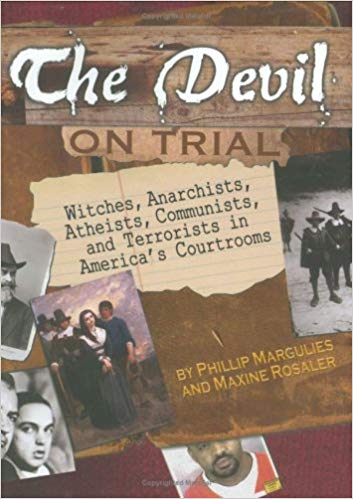The Devil on Trial: A Book Review

The Devil on Trial, quite an intriguing title don’t you think? This nonfiction novel by Philip Marguiles and Maxine Rosaler explores the evolution of America’s courtroom, in the midst of political ideologies and powerful allegations made against a variety of individuals throughout American history.
The novel begins addressing the Salem Witch trials that occurred in Salem, Massachusetts in the nineteen century. Beginning with two girls that were experiencing psychotic episodes, witches seemed like the obvious cause for their erratic behavior. The trials escalated as young girls, mostly from prominent families accused innocent people, mostly women, of witchcraft. Once accused, these individuals had the choice to confess to their ungodly ways and serve time in prison, or refuse to confess and suffer trial which ultimately led to a hanging. This occurred in the context of a bad growing season for the residents of Salem and the harsh winter and lack of resources for the lower classes. The magistrates which represented the court inevitably sided with the young girls that were accusing, until someone of higher authority was subjected to their cruel and tyrannical reign of accusing. After there were a total of nine people hanged including a dog, time passed and the people realized the error of their ways.
The book also addressed the Haymarket Bombing in Chicago during the industrial revolution and the emergence of labor unions. The accused were America’s Devil of the 1900s, the anarchists. Although anarchists supported the overthrow of the government utilizing whatever means necessary, the trial proved unfair in the lack of evidence the court presented to convict five known anarchists. The driving force for the trial was the murder of one of the policemen that had shot and killed many strikers days prior to the bombing. This section of the book addresses the association of anarchism with immigrants. Although this political ideology appealed to immigrants because of its support of the lower classes, the stigma associated with immigrants and a dangerous political view remains a consistent theme throughout American history.
The next subject dealt with the introduction of Charles Darwin’s theory of evolution and the impact it had on Fundamentalist views. What had been a highly religious community in the 1900s was now threatened with this scientific knowledge that ultimately challenged authority figures, including the church, that supported the belief of God and creation. The trial addresses the teaching of this new theory in schools, with a teacher named John Scopes as the representative for the educational system. This shed light on the role religion has played in our society, invoking political affiliations with religion.
Next, communism and its implications in the wake of the red scare was addressed. The man on trial: Alger Hiss a man very close to the president as an adviser accused of being a communist spy. Americans had viewed communism as a contagious disease following the emergence of the Soviet Union has an economic and political powerhouse following WW1. The accuser, Whittaker Chambers had been a previous communist spy but had recanted his ways and became and very strong anti communities advocated for the Times Magazine. What convicted, Hiss would misrepresent America’s cabinet as a corrupt institution. Seemingly enough, the Watergate scandal with Nixon and his administration occurred throughout the period and Nixon was a strong supporter of Hiss and his innocence. There was circumstantial evidence against Hiss regarding top secret government information that had been distributed illegally tied to his typewriter, however throughout the trial Hiss claimed to have no affiliation with Chambers at all. Then inconsistencies and the sublime evidence made the case an interesting on to follow.
Finally, bringing the book to a close, the trial of Zachariah Moussani occurred after the catastrophe of 9/11 and his association with Al Qaeda presented itself to be the greatest lengths the judicial system went to to properly execute justice. This was ironic considering the Islamic Fundamentalist basked in the glory of being tried and even refused to have counsel to represent him. The death sentence was not brought upon him, but Moussani was sentenced to life in prison.
Ultimately the intent behind the book was to expose the judicial flaws and historical martyrs that are a result of an inadequate legal procedures tainted by corrupt officials. Definitely worth a read!!

